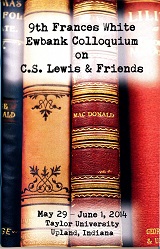Event Title
Paper Session 1-B
Location
Euler 108
Start Date
29-5-2014 3:45 PM
Description
"The Influence of G. K. Chesterton upon C. S. Lewis" - Will Vaus
When C. S. Lewis went up to Oxford for the first time in December 1916, he had never heard of the contemporary writer, G. K. Chesterton. This simple fact reveals something of Lewis' preference for "older works", a preference to which he would hold throughout his life. It was during Lewis' first wartime convalescence in Le Tréport, France in 1918 that he first read Chesterton. Lewis later said that Chesterton made an "immediate conquest" of him, but he did not know why. It does seem strange that an avowedly Christian author would appeal to Lewis during this, the darkest period of his atheism. Lewis even said he liked Chesterton for his "goodness" despite the fact that Lewis had no intention of pursuing goodness himself. Lewis later drew the following lesson from the experience: "In reading Chesterton, as in reading MacDonald, I did not know what I was letting myself in for. A young man who wishes to remain a sound atheist cannot be too careful of his reading."
"A Day in the Life of a Hero: The Three Unities in C. S. Lewis's Neo-Classical Romance" - Joe R. Christopher
C.S. Lewis's "The Nameless Isle" is, if one ignores the first fifty-seven lines as an introduction, curiously shaped to meet the requirements of the Three Unities as the Renaissance and as Neo-classicism understood Aristotle's Poetics. Or at least two of them. The Unity of Place is obvious: all the action is set on the same isle. The Unity of Plot may be debatable since the dwarf has more to do with the resolution of the conflict than the hero does, but at least there is only one basic conflict. And, most impressive of the Three, all the action occurs on one day. This paper will trace, in particular, the single day of the action. The conclusion will consider the paradox of a verse romance tied to rules for drama, and will suggest Shakespeare's Tempest (not Mozart's Magic Flute) as a model for the form.
"Looking Homeward: Transatlantic explorations of Sehnsucht in Thomas Wolfe and C. S. Lewis" - Jedidiah Evans
Event Type
Paper
Link to Papers
The Influence of G. K. Chesterton upon C. S. Lewis (Not available)
A Day in the Life of a Hero: The Three Unities in C.S. Lewis's Neo-Classical Romance
C.S. Lewis, Thomas Wolfe, and the Transatlantic Expression of Sehnsucht
Paper Session 1-B
Euler 108
"The Influence of G. K. Chesterton upon C. S. Lewis" - Will Vaus
When C. S. Lewis went up to Oxford for the first time in December 1916, he had never heard of the contemporary writer, G. K. Chesterton. This simple fact reveals something of Lewis' preference for "older works", a preference to which he would hold throughout his life. It was during Lewis' first wartime convalescence in Le Tréport, France in 1918 that he first read Chesterton. Lewis later said that Chesterton made an "immediate conquest" of him, but he did not know why. It does seem strange that an avowedly Christian author would appeal to Lewis during this, the darkest period of his atheism. Lewis even said he liked Chesterton for his "goodness" despite the fact that Lewis had no intention of pursuing goodness himself. Lewis later drew the following lesson from the experience: "In reading Chesterton, as in reading MacDonald, I did not know what I was letting myself in for. A young man who wishes to remain a sound atheist cannot be too careful of his reading."
"A Day in the Life of a Hero: The Three Unities in C. S. Lewis's Neo-Classical Romance" - Joe R. Christopher
C.S. Lewis's "The Nameless Isle" is, if one ignores the first fifty-seven lines as an introduction, curiously shaped to meet the requirements of the Three Unities as the Renaissance and as Neo-classicism understood Aristotle's Poetics. Or at least two of them. The Unity of Place is obvious: all the action is set on the same isle. The Unity of Plot may be debatable since the dwarf has more to do with the resolution of the conflict than the hero does, but at least there is only one basic conflict. And, most impressive of the Three, all the action occurs on one day. This paper will trace, in particular, the single day of the action. The conclusion will consider the paradox of a verse romance tied to rules for drama, and will suggest Shakespeare's Tempest (not Mozart's Magic Flute) as a model for the form.
"Looking Homeward: Transatlantic explorations of Sehnsucht in Thomas Wolfe and C. S. Lewis" - Jedidiah Evans


